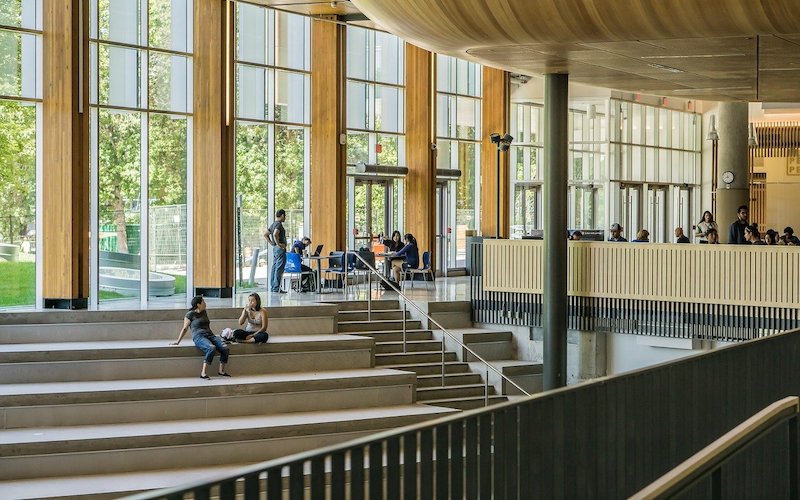The subject of sustainability has received a lot of attention from universities in recent years. Administrators are increasing their efforts to create sustainable operations by adopting innovative techniques. Colleges are making the switch to environmentalism to preserve their efficiency without wasting resources.
Students are also taking notice, as they’re more concerned with sustainability than ever. These students are the ones who will have to contend with a world affected by climate change, so their stake in the issue is clear. It makes sense, then, why sustainability efforts are front and center.
Colleges show students they’re willing and able to create change by adhering to sustainable practices. People uphold their morals in what they buy, wear, and eat — and this extends to the colleges they attend, as well. Schools are changing their approach to education, community service, and student engagement to embody eco-conscious values.
So how are they going about it?
Sustainable Dining
Food is arguably one of the most popular targets for sustainability. Everyone needs food to survive, and people want to know what they’re putting in their bodies. They want assurance from companies that their food is safe for both humans and the environment. Is organic food truly healthy if harvesting it requires acres of deforestation and gallons on gallons of pesticides?
Universities have begun partnering with farms and sustainable food companies for better ingredients. Obtaining food from local sources supports the community, reduces fossil fuels, and addresses unethical sourcing. Universities — and students, in turn — know where their meat and vegetables come from and how farmers raise them. Students can enjoy improved health from eating meat and crops without antibiotics, remnants of pesticides, or synthetic fertilizers.
Carbon Neutrality
Colleges are shrinking their carbon footprints by integrating energy-saving instruments like solar panels and LED lighting. Harvard has created an entirely carbon-free building called HouseZero with solar lighting, geothermal heating, and natural ventilation. This structure houses the Harvard Center for Green Buildings and Cities and proves even older buildings can be sustainable
Bristol University plans to end all reliance on fossil fuels by 2030, and they’ve reduced their carbon emissions by 27-percent since 2005. Attaining carbon neutrality is a matter of downsizing or eliminating wasteful, resource-intensive operations. How each college achieves this depends on which eco-friendly methods function best within the context of the school. Whether it’s LEED-certifiable structures, wind turbines, or biofuels, universities have a plethora of options for decreasing carbon output.
Waste Management
Sustainable foods and green building materials are essential to sustainability, and so is proper disposal of them. A lot of the waste people produce — whether in the U.S. or across the world — ends up in landfills. These landfills continue to expand and prove unsafe for various ecosystems due to the spread of toxic waste and harmful debris. Sustainable waste management techniques such as recycling reduce the amount of toxins humans and animals encounter.
The top 50 green colleges across the world divert 50-percent of their waste from landfills or incinerators, shrinking their contributions to air and water pollution. Large institutions like businesses and colleges are often responsible for much of the trash you encounter in dumps or bodies of water. There will be far fewer pollutants to contend with if more corporations adopt clean waste management methods.
Universities extend their recycling efforts to students by organizing recycling programs and implementing accessible waste bins. Waste management programs teach students what kinds of garbage they can recycle or send to hazardous waste facilities. They learn various ways to reuse materials instead of trashing them, such as keeping plastic containers for new purposes. These green programs also inform learners of sustainable alternatives to resource-intensive goods.
Related: 3 Ways to Reduce Your Carbon Footprint
Green Degrees
Degrees in subjects like environmental studies and urban planning are becoming more common. Governments, higher-ed institutions, and citizens alike want green infrastructure, but they can’t obtain this without people knowledgeable about sustainability. Colleges are responding to the need for scholars by implementing majors focusing on environmental topics.
Each major will be different depending on the school and area of concentration — such as law or architecture. Some subjects you’re likely to see in an eco-course include environmental policy and ecosystem management. And if you’re wondering how lucrative this field is, there’s no shortage of well-paying jobs. You can be an environmental scientist, climate change analyst, agricultural engineer, and much more.
Social Engagement
Many environmentalists agree that social efforts have a major place in sustainability. The social spectrum includes initiatives like building sustainable low-income housing and providing citizens with clean, healthy drinking water. This dimension emphasizes the need for human wellness and access to basic rights. Many of the green techniques colleges adopt inherently benefit the social aspect, but there are more direct ways to reach out.
Successful social ventures include helping local communities organize sustainable events, volunteering for individuals in need and providing funding for green initiatives. Students at American University hosted a food justice event in 2018 to discuss ways to decrease waste and deliver more goods to those without food. Simon Fraser University in Canada aligns its corporate practices with the UN’s human rights conventions and seeks to beat injustice through inclusive education.
When colleges reach out to assist local citizens, they spread their knowledge of sustainability through the community. Doing so inspires people to participate in the movement and work toward a healthier future.
Green Universities Empower the World
Universities will continue to develop new ways to engage with sustainability as the educational landscape shifts. Students and educators play crucial roles in ushering in an era of green practices.
Educators teach the upcoming generations, and students spread this knowledge through creation and innovation. Ultimately, empowering schools to make greener choices strengthens the world.











